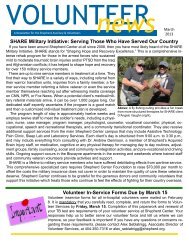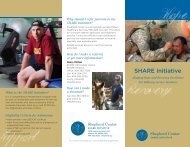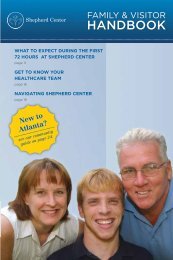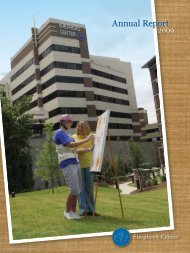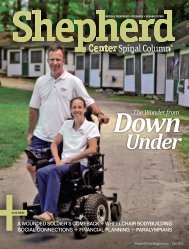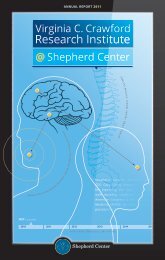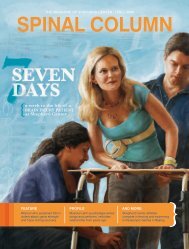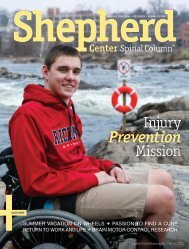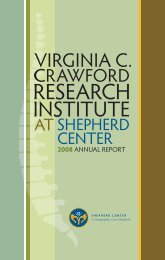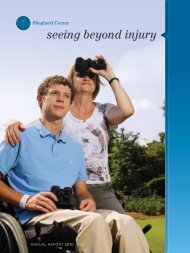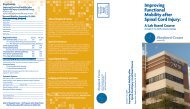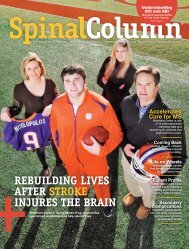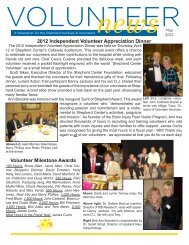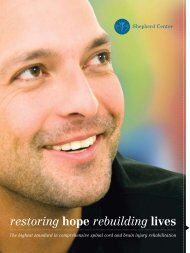INJURED - Shepherd Center
INJURED - Shepherd Center
INJURED - Shepherd Center
You also want an ePaper? Increase the reach of your titles
YUMPU automatically turns print PDFs into web optimized ePapers that Google loves.
{<br />
{<strong>Shepherd</strong> Snapshots: A Look at News and Other Notes<br />
Self-defense Expert Teaches<br />
People in Wheelchairs How<br />
to Fight Back<br />
Change the plan of the aggressor, and you’ve got a fighter’s chance.<br />
That’s what self-defense expert Ryan Mitchell is trying to teach<br />
his students in wheelchairs – ways to make an attacker decide it’s<br />
just not worth it.<br />
Mitchell, who owns World Class American Karate in Conyers,<br />
Ga., began teaching self-defense classes at <strong>Shepherd</strong> <strong>Center</strong> more<br />
than a year ago. Since then, he’s taught about 100 patients at the<br />
hospital.<br />
“We want students to feel empowered, that they can take care of<br />
themselves, even though a situation is different from what they are<br />
used to,” Mitchell explains.<br />
Working with <strong>Shepherd</strong> sports specialist Chris Ravotti,<br />
Mitchell devised a curriculum of self-defense basics – avoiding<br />
certain situations and how to not look like a victim.<br />
“That’s how I start off any self-defense class,” Mitchell says.<br />
“Then we talk about how people in wheelchairs can be robbed or<br />
confronted while transferring into their vehicles. We teach them to<br />
be aware of their situation.”<br />
Sometimes, though, you can look like a person with purpose<br />
and pay attention to your surroundings, but still get attacked. So<br />
Mitchell spends ample time during the class, which he teaches<br />
every six weeks at <strong>Shepherd</strong>, to allow students to try out some selfdefense<br />
techniques he teaches them.<br />
“If you end up in a situation where you have to defend yourself,<br />
we go over the moves, striking targets with an elbow or fist if you<br />
can, using the chair as a defense mechanism, using it to throw off<br />
the aggressor,” Mitchell explains. “We adapt the program for students<br />
in power chairs or manual chairs. The students have different<br />
chairs and different capabilities as far as what they can move.”<br />
Above: Ryan Mitchell, who owns World Class American Karate in Conyers,<br />
Ga., teaches self-defense classes to <strong>Shepherd</strong> <strong>Center</strong> patients who use<br />
wheelchairs.<br />
And yes, a wheelchair can be used offensively, as well as defensively. “A<br />
power chair can be a 600-pound battering ram, doing some damage to the<br />
shins and ankles,” Mitchell says. “With the manual chair, the foot rest is<br />
great for hurting an attacker’s ankles. It’s not a mortal finishing move, but<br />
often it’s enough. The whole idea is to convince the aggressor they are not<br />
dealing with someone helpless.” — Bill Sanders<br />
Photo by Gary Meek<br />
<strong>Shepherd</strong> <strong>Center</strong> Adds New Doctor to Brain Injury Program<br />
Photo by Leita Cowart<br />
Dr. Payal Fadia, a brain injury and rehabilitation specialist, recently joined <strong>Shepherd</strong> <strong>Center</strong>’s Acquired<br />
Brain Injury (ABI) program. She is leading two ABI treatment teams and one neurospecialty team.<br />
“We are pleased to add Dr. Fadia to the <strong>Shepherd</strong> <strong>Center</strong> team as we continue to expand our ABI<br />
program,” says Dr. Donald Leslie, medical director of <strong>Shepherd</strong> <strong>Center</strong>. “Dr. Fadia’s experience and<br />
expertise will ensure <strong>Shepherd</strong> <strong>Center</strong> continues to provide the highest quality of care to its patients.”<br />
The hospital’s ABI unit recently increased to 30 beds with 22 private rooms as part of a $53 million<br />
expansion, allowing more than 250 patients to receive medical and rehabilitation care each year.<br />
Before joining <strong>Shepherd</strong> <strong>Center</strong>, Dr. Fadia was the attending physician at Rehabilitation Consultants<br />
in Norwalk, Conn. She has also practiced at The Brain Injury and Stroke Program at The Institute for<br />
Rehabilitation and Research in Houston. Additionally, she was an assistant professor at Baylor College<br />
of Medicine. — Kayla Eubanks<br />
2 Spinal column<br />
www.shepherd.org



